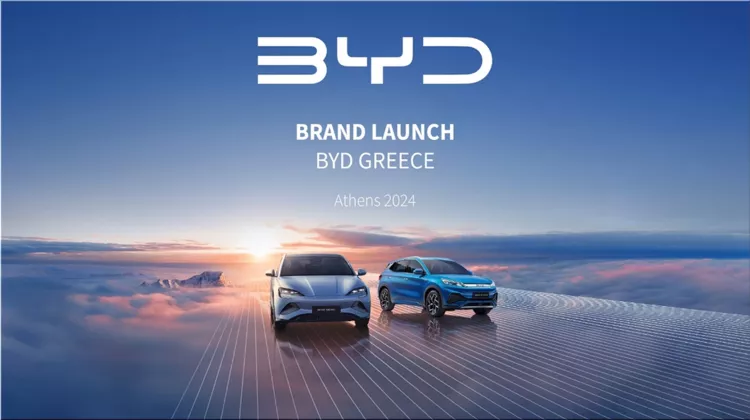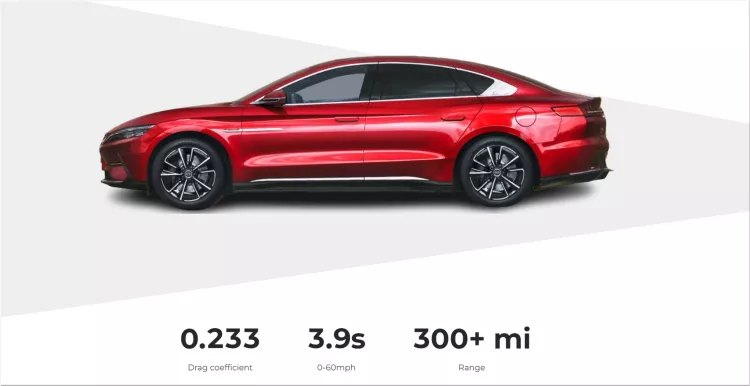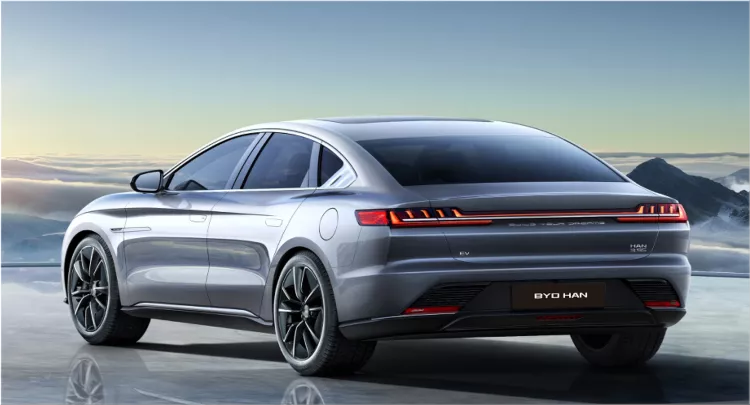Electric Vehicle (EV) giant BYD (Build Your Dreams) has set its sights on a new market – Greece. On March 22nd, 2024, the company officially debuted its electric cars in the Greek market, marking a significant step in its global expansion strategy. This move by BYD positions it to capitalize on the growing demand for electric vehicles in Greece and the wider European region.
A Thriving EV Market Beckons
The Greek automotive industry is transforming, with a growing preference for eco-friendly vehicles. Government incentives and rising fuel costs have fueled consumer interest in EVs. In 2023, EV sales in Greece surged by over 70% compared to the previous year, highlighting the rapid adoption of this technology. According to a report by JATO Dynamics, a leading automotive data provider, battery electric vehicles (BEVs) accounted for over 8% of all new car sales in Greece in 2023. This trend is expected to accelerate in the coming years, driven by government policies, technological advancements, and increasing consumer awareness about the environmental benefits of EVs.
BYD's Strategic Advantage
BYD, a pioneer in the EV industry, boasts a distinct advantage: it manufactures both electric vehicles and the lithium-ion batteries that power them. This vertical integration allows BYD to control costs, ensure quality, and adapt to evolving battery technology. Additionally, BYD offers a diverse range of EVs, including cars, buses, trucks, and even forklifts. This comprehensive product portfolio caters to a wide range of consumer and commercial needs in the Greek market. Unlike many EV manufacturers who rely on outside suppliers for batteries, BYD's in-house battery production capability gives them greater control over quality, pricing, and innovation. This is a significant advantage in a market where battery range and cost are key purchase considerations for consumers.
Tailored for the Greek Consumer
For its debut in Greece, BYD has strategically selected two popular models – the BYD Tang EV and the BYD Han EV. Both SUVs are known for their sleek design, spacious interiors, and impressive range. The Tang EV boasts a driving range of over 500 kilometers (around 310 miles) on a single charge, while the Han EV offers a range exceeding 550 kilometers (around 342 miles). This extended range assuages a common concern among EV buyers – range anxiety – making BYD's offerings highly attractive to Greek consumers.
BYD plans to introduce additional models to the Greek market in the future, catering to a wider range of consumer preferences and price points. This phased approach allows BYD to gauge market response and tailor its product offerings to best suit the needs of Greek consumers.
Government Support Paves the Way
The Greek government has actively promoted the adoption of EVs through various initiatives. These include subsidies of up to €8,000 (approximately $9,100) for purchasing new electric cars, tax breaks for EV ownership, and expanding charging infrastructure. The government has set a target of having at least 300,000 electric vehicles on the road by 2030. This supportive policy environment creates a fertile ground for BYD's entry into the Greek market.
Building a Robust Dealer Network
BYD recognizes the importance of a strong dealer network for its success in Greece. The company has partnered with established automotive dealerships across the country, including the Sfakianakis Group, a leading automotive distributor in Greece. This strategic collaboration will ensure the widespread availability of BYD vehicles, provide exceptional customer service, and offer readily accessible after-sales support throughout the country. BYD dealerships will be equipped with trained personnel to answer customer questions, conduct test drives, and facilitate the sales and service process.
A Look at the Road Ahead
BYD's foray into the Greek EV market presents exciting opportunities. The company's diverse product portfolio, competitive pricing strategy, commitment to quality, and understanding of the local market position capture a significant share of the growing EV market in Greece. With government support, a robust dealer network in place, and a continued focus on innovation, BYD is poised to become a major player in the Greek automotive landscape.
Beyond the Headlines: What This Means for Greece and the EV Industry
BYD's entry into the Greek market has far-reaching implications. Here's a closer look:
- Increased Competition: The arrival of a new major player like BYD will intensify competition in the Greek EV market. This can lead to more competitive pricing, a wider variety of EV options for consumers, and potentially faster innovation in the sector. With more EV manufacturers entering the Greek market, consumers will benefit from a wider range of electric vehicle choices that cater to different needs and budgets. This can drive down prices and encourage further development of electric vehicle technology.
- Boost for the Environment: The wider adoption of EVs in Greece will reduce greenhouse gas emissions and improve air quality. This aligns with the country's environmental goals as outlined in the National Energy and Climate Plan (NECP). The NECP sets ambitious targets for reducing greenhouse gas emissions and increasing the use of renewable energy sources. EVs are crucial in achieving these goals by producing zero tailpipe emissions. According to a European Environment Agency (EEA) study, transportation accounts for a significant portion of greenhouse gas emissions in Europe. By promoting EV adoption, Greece can significantly reduce its carbon footprint and contribute to a cleaner environment for its citizens.
- Job Creation: The growth of the EV industry in Greece has the potential to create new jobs in manufacturing, sales, service, and related sectors. This can contribute to the country's economic growth and development. The expansion of the EV industry will require a skilled workforce to design, manufacture, maintain, and service electric vehicles. This presents an opportunity for job creation in various sectors, including:
- EV manufacturing: As BYD and other EV manufacturers establish a presence in Greece, there will be a demand for skilled workers in production lines, battery assembly plants, and other manufacturing facilities.
- EV sales and service: The growing number of EVs on the road will necessitate a robust network of dealerships and service centers. This will create jobs for sales personnel, service technicians, and charging infrastructure specialists.
- Clean energy sector: The increased reliance on EVs will drive demand for renewable energy sources to power charging stations. This can lead to job creation in the renewable energy sector, such as solar and wind power generation.
- Infrastructure Development: The widespread adoption of EVs necessitates the development of a robust charging infrastructure. The Greek government has recognized this need and is investing in expanding the country's charging network. This includes installing charging stations in homes, workplaces, public spaces, and along major highways. BYD, along with other EV manufacturers, is also likely to play a role in developing the charging infrastructure in Greece. This collaboration between the public and private sectors is crucial for ensuring a seamless transition to electric mobility.
A Turning Point for Electric Mobility in Greece
BYD's debut in Greece marks a significant turning point for electric mobility in the country. The company's strategic entry, coupled with supportive government policies, a growing consumer appetite for EVs, and an increased focus on infrastructure development, creates a positive outlook for the future of electric transportation in Greece. As BYD expands its footprint and other EV manufacturers follow suit, Greece can expect to witness a continued surge in EV adoption, paving the way for a cleaner and more sustainable transportation ecosystem. This shift towards electric mobility will not only benefit the environment but also create new economic opportunities and contribute to the overall progress of the Greek automotive industry.
BYD, the world's largest manufacturer of electric vehicles, is planning to open a European factory. Recent reports have indicated that the Chinese are considering making a bid to purchase the Ford facility located in Saarlouis, Germany.… Continue reading
The government has made it clear, and the automobile industry is responding: the electric car is the way of the future. Is that, however, also your present? We can assist you in answering this question. Brands continue to promote large-… Continue reading
The start of sales of the BYD Han electric car in China is scheduled for the end of June this year. For Europe, precise dates are still unknown, but preliminary prices are mentioned. A BYD Han electric car can be bought by paying from 45,000 to 55,000… Continue reading
In recent months, the framework conditions for a quick ramp-up of electromobility have deteriorated dramatically due to a shift in interest rates, inflation, and growing costs for batteries, automobiles, and electricity. According to the… Continue reading














